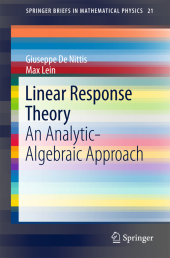 Neuerscheinungen 2017Stand: 2020-02-01 |
Schnellsuche
ISBN/Stichwort/Autor
|
Herderstraße 10
10625 Berlin
Tel.: 030 315 714 16
Fax 030 315 714 14
info@buchspektrum.de |

Giuseppe De Nittis, Max Lein
(Beteiligte)
Linear Response Theory
An Analytic-Algebraic Approach
1st ed. 2017. 2017. x, 138 S. 235 mm
Verlag/Jahr: SPRINGER, BERLIN; SPRINGER INTERNATIONAL PUBLISHING 2017
ISBN: 3-319-56731-4 (3319567314)
Neue ISBN: 978-3-319-56731-0 (9783319567310)
Preis und Lieferzeit: Bitte klicken
This book presents a modern and systematic approach to Linear Response Theory (LRT) by combining analytic and algebraic ideas. LRT is a tool to study systems that are driven out of equilibrium by external perturbations. In particular the reader is provided with a new and robust tool to implement LRT for a wide array of systems. The proposed formalism in fact applies to periodic and random systems in the discrete and the continuum. After a short introduction describing the structure of the book, its aim and motivation, the basic elements of the theory are presented in chapter 2. The mathematical framework of the theory is outlined in chapters 3-5: the relevant von Neumann algebras, noncommutative $L^p$- and Sobolev spaces are introduced; their construction is then made explicit for common physical systems; the notion of isopectral perturbations and the associated dynamics are studied. Chapter 6 is dedicated to the main results, proofs of the Kubo and Kubo-Streda formulas. The book closes with a chapter about possible future developments and applications of the theory to periodic light conductors.
The book addresses a wide audience of mathematical physicists, focusing on the conceptual aspects rather than technical details and making algebraic methods accessible to analysts.
Introduction.- Setting, Hypotheses and Main Results.- Mathematical Framework.- A Unified Framework for Common Physical Systems.- Studying the Dynamics.- The Kubo Formula and its Adiabatic Limit.- Applications.
Giuseppe De Nittis is Assistant Professor of the Facultad de Matemáticas at the Pontificia Universidad Católica de Chile in Santiago. He got his PhD in 2010 at SISSA (Trieste, Italy) working on the geometric interpretation of the Quantum Hall Effect and its relation with the Kubo formula. In the last years he worked constantly at the boundary between topology, algebra and analysis to face problems coming from the condensed matter area, with a special focus on the theory of topological insulators. More information can be found on his web page (gdenittis.wordpress.com).
Max Lein is Assistant Professor at the Advanced Institute of Materials Research, which is associated to Tohoku University in Sendai Japan. He completed his PhD in 2011 at the Technische Universität München under the supervision of Prof. H. Spohn. He has worked for over 10 years on the rigorous analysis of problems from condensed matter physics, in particular topological effects, using tools from analysis and algebra. More recently, he broadened his field of interest to periodic light conductors. In his analyses, he has applied and developed pseudodifferential and semiclassical methods, and combined algebraic and analytic techniques (e. g. to analyze essential spectra of magnetic pseudodifferential operators). More information can be found on his homepage (maxlein.com).


